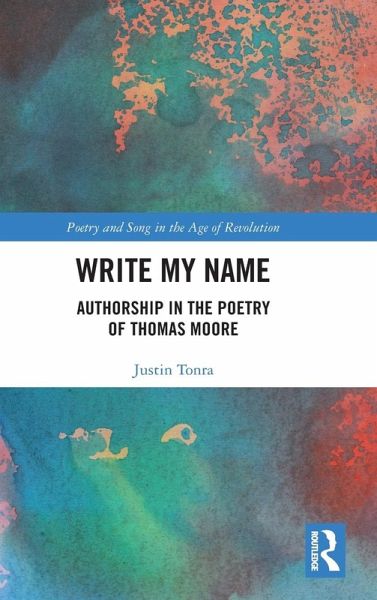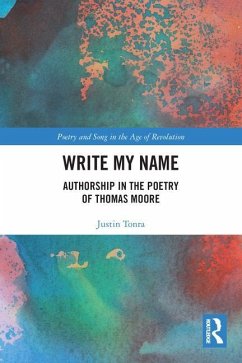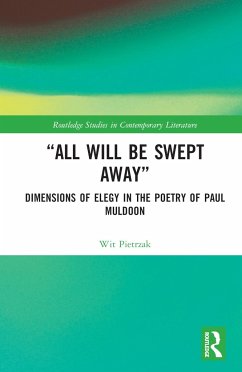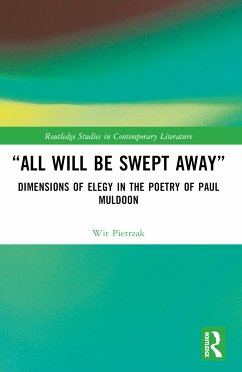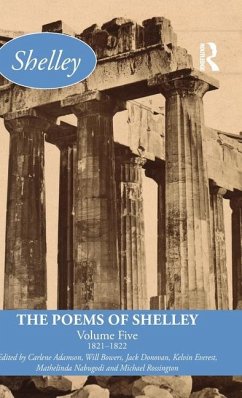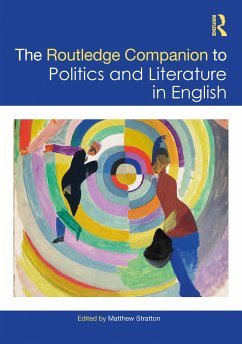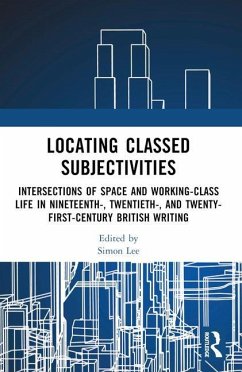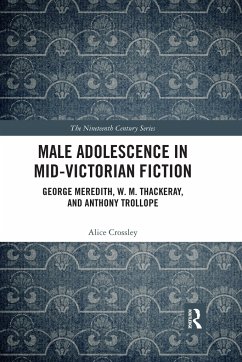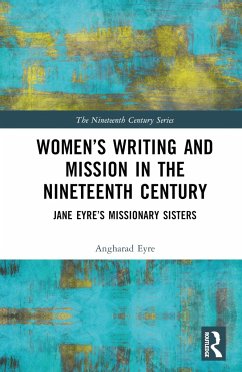Versandkostenfrei!
Versandfertig in 1-2 Wochen
Weitere Ausgaben:

PAYBACK Punkte
85 °P sammeln!





Write My Name: Authorship in the Poetry of Thomas Moore is the first monograph devoted to Mooreâ s poetry, and argues for the value of attending to neglected aspects of Mooreâ s poetic work through analysis of his shifting modes of authorship and their various motivations.
Justin Tonra is Lecturer in English at the National University of Ireland Galway. His research interests are in the fields of digital humanities, book history, textual studies and bibliography, and at the intersections of literature and technology. He has previously held positions at University College London and the University of Virginia.
Produktdetails
- Poetry and Song in the Age of Revolution
- Verlag: Taylor & Francis Ltd
- Seitenzahl: 210
- Erscheinungstermin: 1. September 2020
- Englisch
- Abmessung: 235mm x 157mm x 16mm
- Gewicht: 436g
- ISBN-13: 9780367416171
- ISBN-10: 0367416174
- Artikelnr.: 60000486
Herstellerkennzeichnung
Libri GmbH
Europaallee 1
36244 Bad Hersfeld
gpsr@libri.de
"A groundbreaking contribution to literary studies, Write My Name elegantly combines textual analysis, book history, publication history and digital methods. In this engaging and insightful study, Tonra deepens and expands not only our knowledge of the Romantic poet-author Thomas Moore but also our understanding of authorship itself." Margaret Kelleher, Chair of Anglo-Irish Literature and Drama, University College Dublin
"What has been called 'the Central Self' organizes nearly all studies of Romantic authorship. The Thomas Moore we meet in this book shows how limited that view of Romantic writing and writers can be. Advancing a 'model of opposition' to that model, Tonra's argument carries conviction because his book is
"What has been called 'the Central Self' organizes nearly all studies of Romantic authorship. The Thomas Moore we meet in this book shows how limited that view of Romantic writing and writers can be. Advancing a 'model of opposition' to that model, Tonra's argument carries conviction because his book is
Mehr anzeigen
itself a scholarly model for how to investigate the complex forcefield in which all literary works live and move and have their being." Jerome McGann, University of Virginia
"A dazzling study of the work of Thomas Moore, more than meeting the considerable challenges laid down by this most stylish of authors while also raising new questions for the field at large." Claire Connolly, Professor of Modern English, University College Cork
"Justin Tonra's book asks us not just to look at the career of Thomas Moore again but also to view an entirely new Romantic-era author. Write my Name is about 'Thomas Moore' but also about the many fugitive personae that emanated from him, pseudonymous - Thomas Little, Thomas Brown, Anacreon, Feramorz, narrator of Lalla Rookh, even 'Tom Moore' - and anonymous - the periodical reviewer who can be teased into attributed authorship by computational analysis. Where Moore has been well-served by Irish literary critics and those interested in the matter of word and music in the Irish Melodies, Tonra moves the critical ground in an entirely new direction, offering sophisticated and always throughful readings in Romantic book history and the digital humanities while bringing them round to the contrasting distant and close reading of Moore and his contemporaries." Matthew Campbell, Professor of Modern Literature, University of York
"A dazzling study of the work of Thomas Moore, more than meeting the considerable challenges laid down by this most stylish of authors while also raising new questions for the field at large." Claire Connolly, Professor of Modern English, University College Cork
"Justin Tonra's book asks us not just to look at the career of Thomas Moore again but also to view an entirely new Romantic-era author. Write my Name is about 'Thomas Moore' but also about the many fugitive personae that emanated from him, pseudonymous - Thomas Little, Thomas Brown, Anacreon, Feramorz, narrator of Lalla Rookh, even 'Tom Moore' - and anonymous - the periodical reviewer who can be teased into attributed authorship by computational analysis. Where Moore has been well-served by Irish literary critics and those interested in the matter of word and music in the Irish Melodies, Tonra moves the critical ground in an entirely new direction, offering sophisticated and always throughful readings in Romantic book history and the digital humanities while bringing them round to the contrasting distant and close reading of Moore and his contemporaries." Matthew Campbell, Professor of Modern Literature, University of York
Schließen
Für dieses Produkt wurde noch keine Bewertung abgegeben. Wir würden uns sehr freuen, wenn du die erste Bewertung schreibst!
Eine Bewertung schreiben
Eine Bewertung schreiben
Andere Kunden interessierten sich für




